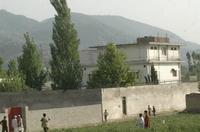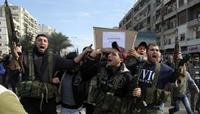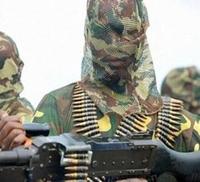-
Ukrainian man in U.K. court charged with anti-Muslim terrorism
Pavlo Lapshyn, a 25-year-old postgraduate student from Dnipropetrovsk, Ukraine, appeared in a Westminster, U.K. court Tuesday and charged with the terror-related April murder of an 82-year-old Mohammed Saleem as Saleem was walking home from a mosque. Lapshyn has also been charged with three additional offenses related to three explosions near mosques in Walsall, Wolverhampton, and Tipton.
-
-
Florida teen indicted on terrorism charges
Shelton Thomas Bell, 19, of Jacksonville, Florida has been indicted on federal charges of conspiring to provide material support to terrorists. The indictment claims Bell planned to travel to Arabian Peninsula and join Ansar Al-Sharia (AAS), an alias for Al Qaeda in the Arabian Peninsula, to take part in “jihad.”
-
-
DHS raises Phoenix’s terror-risk ranking
DHS has raised Phoenix’s terrorist risk assessment three spots, from number eighteen to number fifteen. The change will entitle the city to $5.5 million in a federal security grant, $1.5 million more than it received from the same grant last year.
-
-
Pa. man sentenced to 8 ½ years for running a terrorism-promoting Internet forum
A western Pennsylvania man has been sentenced to eight and a half years in prison for leading an Internet forum which promoted terrorist attacks against American military and civilian targets. Emerson Begolly, 24, of Redbank Township was also convicted of having a concealed gun and biting an FBI agent when he was arrested in 2011.
-
-
OBL: Hiding in plain sight

Osama bin Laden had been living in his walled Abbottabad compound for nearly ten years, within sight of an elite Pakistani military academy, and gone completely unnoticed. According to a scathing official Pakistani report, the incompetence and negligence of Pakistan’s Inter-Services Intelligence (ISI) failed to realize that the world’s most sought-after terrorist leader had been living in Pakistan, until he was killed in a night-time raid by U.S. Navy SEALs on 2 May 2011.
-
-
Giuliani says political correctness hampers fight against domestic terrorists
The Department of Defense initially described Army Major Nidal Hassan’s Fort Hood shooting spree as “terrorism,” but quickly changed that definition to “workplace violence.” Testifying before a congressional panel, former New York City mayor Rudy Giuliani criticized DoD’s decision, and political correctness more generally, saying that “You can’t fight an enemy you don’t acknowledge.”
-
-
Russia: Syria rebels used sarin gas
Vitaly Churkin, Russia’s UN ambassador, announced at a UN news conference Tuesday that scientific analysis by Russian labs of a suspected chemical weapons attack in Syria on 19 March concluded the attack probably had been carried out by rebels using sarin nerve gas of “cottage industry” quality. He said the gas was delivered by a crudely made missile.
-
-
Gen. Dempsey: Syria could be a “10-year issue”

The U.S. top soldier said the United States is facing a “10-year issue” in Syria: “if we fail to think about [the Syrian issue] as a 10-year regional issue, we could make some mistakes,” General Martin Dempsey, chairman of the Joint Chiefs of Staff, said.
-
-
Jihadi cleric Abu Qatada deported from U.K. to stand trial in Jordan

After eight years of protracted and costly legal battles, Jihadi cleric Abu Qatada was deported from the United Kingdom to Jordan. Sunday morning he was flown on private chartered jet, accompanied by four British police officers, who handed him over to their Jordanian counterparts. Abu Qatada’s deportation to his native Jordan has cost the U.K. government a total o £1.7 million, of which£647,658 went to pay for the public defenders of the cleric.
-
-
Nigerian Islamic extremists burn children alive during attack on boarding school

At least twenty-nine high school students and a teacher are dead after militants from the Islamic Boko Haram group attacked a boarding school in northeast Nigeria. The Islamists set the school dorm on fire while students, aged 10 to 15, were sleeping inside. Most of the dead were burned alive inside the dorm. The militant waited outside the dorm, and shot those who tried to escape the burning building.
-
-
U.S. ports vulnerable to cyberattacks
New study says that the U.S. largest ports are vulnerable to cyberattacks.The study argues that the level of cyber security awareness and culture in U.S. port facilities is relatively low, and that a cyberattack at a major U.S. port would quickly cause significant damage to the economy.
-
-
Arab world welcomes Brotherhood’s fall
Leaders throughout the Arab world could barely contain their glee at the news that the short and acrimonious era of Muslim Brotherhood rule in Egypt is over, and is not likely to return. The fractious Arab world has rarely shown such unanimity. Familiarity breeds contempt, though, and the antipathy toward the Brotherhood and its brand of politics has always been something most Arabs – secular and religious – could agree on, and on Thursday the region was awash with schadenfreude.
-
-
Protecting drinking water systems from deliberate contamination

The importance of water and of water infrastructures to human health and to the running of the economy makes water systems likely targets for terrorism and CBRN (chemical, biological, and radionuclide) contamination. Reducing the vulnerability of drinking water systems to deliberate attacks is one of the major security challenges. An international project has developed a response program for rapidly restoring the use of drinking water networks following a deliberate contamination event.
-
-
Egypt’s military ousts Morsi from the presidency, suspends constitution
Acting on its ultimatum, the Egyptian military has ousted Mohammed Morsi from the presidency of Egypt and announced that the constitution, ratified last December, has been suspended. Parliament, too, has been disbanded. Government ministers were ordered to clean their desks and vacate their offices. The chief of the constitutional court will assume the role of president on an interim basis.
-
-
Isolated, defiant Morsi rallies his supporters for battle as army’s ultimatum looms
Facing an ultimatum issued Monday by Egypt’s powerful army, President Mohamed Morsi, in a midnight speech, defiantly announced that he would not resign under pressure and, if necessary, protect his presidency with his life. Analysts note that the speech was aimed to rally his Islamic supporters and prepare them for likely violence ahead, rather than placate the protesters or signal his willingness to reconcile with the demands of the military. The military gave Morsi until 17:00 Egypt’s time (10:00 a.m. EST) to meet the protesters’ demands – chief among them Morsi’s own resignation. In response to Morsi’s speech, the Egyptian military announced: “We swear to God that we will sacrifice even our blood for Egypt and its people, to defend them against any terrorist, radical or fool.”
-